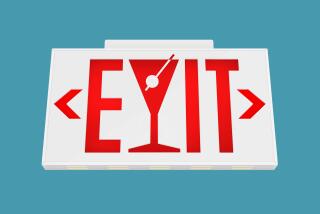Tower Affair Signals Alcohol’s Retreat, but Will It Sound a Call for Prohibition?
- Share via
John Tower’s offer to abstain from alcohol if confirmed as secretary of defense and the serious debate his offer has evoked constitutes one more milestone in America’s changing attitude toward alcohol. Consumption of alcohol, especially distilled spirits, has been declining in the United States since 1980. Last year, per-capita consumption of wine declined, even in California, a dramatic break in a long, sustained rise.
Throughout the 1980s the drunk-driving issue has increasingly alarmed Americans. Through the efforts of Mothers Against Drunk Drivers and Remove Intoxicated Drivers, penalties for driving under the influence have grown more severe. In 1984 a scattering of states were holding out against a national trend to raise the drinking age to 21; the federal government brought them into line by threatening to withhold a portion of federal highway funds. A section of the Anti-Drug Abuse Act of 1988 requires that beginning next November, all alcoholic beverages sold in the United States carry a label warning of birth defects, impairment in operating machinery, including an automobile, and other health problems from drinking the bottle’s contents.
These changes in our national approach toward alcohol reflect the most significant shift against alcohol since Prohibition’s repeal in 1933.
Two themes can be discerned: a shift from seeing alcohol as a cheerful beverage that has a safe consumption limit to perceiving alcohol as a toxin or poison that has no minimum safe limit--the more you drink, the more toxin you consume. The second theme is a gradual amalgamation of alcohol into the ranks of other drugs that have aroused American fear and desire to control opiates, cocaine, tobacco and so on. Another example of these drugs being gathered into one corral was the statement of the surgeon general last fall that nicotine could be compared to cocaine in its power to addict.
Tobacco’s changing image prompted a parallel to Tower’s abstinence pledge from the “drug czar” William J. Bennett. Bennett swore to stop his cigarette habit before undertaking his duties to coordinate our anti-drug program. It will be interesting to see whether he will be asked or moved to make a similar statement with regard to alcohol.
Where is this heading? First, I suggest that alcohol will be the kind of target in the 1990s that tobacco has been in the 1980s. In America the trend against alcohol marked by such significant legal and emotional shifts has more than once progressed to the point where the legal restrictions become more controversial than alcohol. The most likely cause for conflict is not warning labels or lists of ingredients but implementation of a popular theory linking price with alcohol consumption. The art in adding to alcohol taxes is to balance the increase with the danger of stimulating bootlegging. The ideal result would be to increase revenue and reduce consumption, but the political hazard is substantial.
For politicians a strong turn against alcohol may set up a series of experiences similar to the impact of Judge Douglas H. Ginsburg’s past marijuana use. Public opinion has no awareness of historical context; current opinion is an eternal truth. Adjustment to a new public standard must be made by those in front of the public, not by the public. Pledges, conversions and evasions in this area can be expected to rise.
Overall we are experiencing a trend against chemical aids to energy, happiness and insight. Americans, at least the middle class, are searching for health through pesticide-free foods, pure water, clean air and exercise. Cholesterol is a dirty word.
The willingness to face the negative side of alcohol is refreshing after half a century of denial during the backlash to Prohibition. The problem posed by our past temperance movements is that once the toxic image of alcohol has gained dominance, we have felt morally obligated to extinguish alcohol’s availability. As we move further into this attitude, new for our generation, the task will be to maintain a frank awareness of alcohol’s liabilities while escaping the political dead end of alcohol prohibition.
More to Read
Sign up for Essential California
The most important California stories and recommendations in your inbox every morning.
You may occasionally receive promotional content from the Los Angeles Times.













